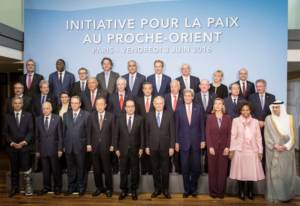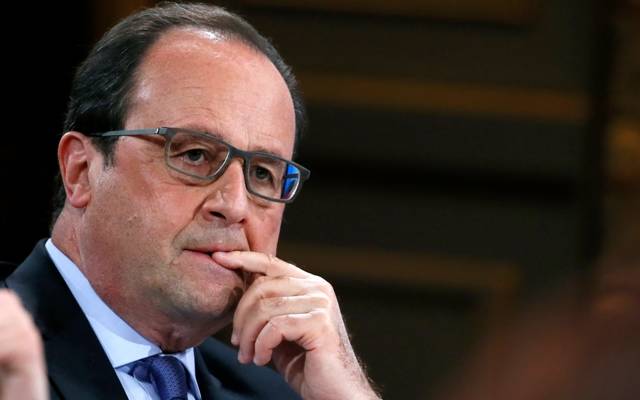
World leaders convene in Paris to discuss the French initiative. (AP/Kamil Zihnioglu, Pool)
Gathering in Paris on Friday to launch the French Peace Initiative, top diplomats from the US and more than two dozen Western and Arab countries discussed how to end the Israeli-Palestinian conflict. Fortunately for Israel, no real conclusion was reached and President Hollande admitted that only direct negotiations can result in peace.
Nations struggled Friday to craft a viable new strategy for peace in Israel, failing to agree on a French proposal for an international conference that would bring together Israel and the Palestinians. Diplomats nevertheless vowed vaguely to reinvigorate a peace process that has been all but dead for two years.
The gathering in Paris of top diplomats from the United States and more than two dozen Western and Arab countries, which excluded Israel and the Palestinians, ended with a call for “fully ending the Israeli occupation,” a rhetorical shift from what Washington has previously endorsed.
But it wasn’t immediately clear if the shift meant a new focus and participants couldn’t outline how they might achieve that goal. As for the proposed peace mediation conference, they only welcomed the “prospect” of such an event later this year. Israel has fiercely opposed it; the US hasn’t been supportive, either. Neither Israeli nor Palestinian officials were present for Friday’s talks.
“A negotiated two-state solution is the only way to achieve an enduring peace, with two states, Israel and Palestine, living side by side in peace and security,” a joint communique said. It called the status quo unsustainable and said “actions on the ground, in particular continued acts of violence and ongoing settlement activity, are dangerously imperiling the prospects for a two-state solution.”
France said it felt compelled to bring world and regional powers together at a time when Mideast peace appears further away than ever.
Israeli Prime Minister Benjamin Netanyahu has pledged to pursue peace and has repeatedly stated that the only way to achieve peace is through direct negotiations. At the same time, Palestinian leaders won’t engage in direct talks and have vowed never again to do so with Israel.
The vague reference to a future international peace conference suggests the idea was rebuffed in private discussions among lower-level aides before French President Francois Hollande, UN Secretary-General Ban Ki-moon and US Secretary of State John Kerry met Friday.
For years, statements by the international Quartet of mediators — the US, Russia, the European Union (EU) and UN — ended with similar language about a future gathering in Russia “at an appropriate time.” That time never arrived.
Asked about a conference, Kerry told reporters: “I have no idea yet.” But he emphasized that right now, “we need to find some immediate kinds of steps on the ground that will make a difference.”
In his opening remarks, Hollande allowed that “we cannot substitute for the parties.” Still, he said his country’s initiative could provide guarantees “that the peace will be solid, sustainable and under international supervision.”
As a first step, working groups will meet in the coming weeks to develop economic and security incentives for both sides, French Foreign Minister Jean-Marc Ayrault told reporters afterward.
Kerry himself led the last meaningful peace push, nine months of mainly indirect talks that collapsed in April 2014.
Israel Still Seeks Direct Negotiations
Palestinian Authority (PA) head Mahmoud Abbas has welcomed France’s efforts. Still, Foreign Minister Riad Malki expressed disappointment.
“We were expecting timelines for the negotiations,” he said, also lamenting the lack of demand to halt Israel construction in Judea and Samaria.
Netanyahu is defiantly opposed to the French initiative. He says a deal can only be reached in direct negotiations. However, he has expressed openness to elements of a 2002 Arab peace proposal that offered Israel recognition throughout the Muslim world after a deal with the Palestinians.
Peace isn’t possible through “imposition,” David Keyes, Netanyahu’s spokesman, said Friday.
“If you have a dispute about your home,” he said, “you don’t fly to another continent and invite 30 people around the world to solve that conflict.”
Netanyahu spoke by phone with Ayrault over the weekend and reiterated Israel’s position that any alternative to direct negotiations without preconditions between Israel and the Palestinians, will only distance peace.
Netanyahu stressed that it would be better if Paris and its partners were to try to encourage Abbas to accept his call for the immediate resumption of negotiations on all issues in dispute.
Netanyahu warned that the French initiative could also hurt regional diplomatic efforts, which he said have a chance of succeeding.
The foreign ministry in Jerusalem earlier issued a statement that the foreign ministers meeting in Paris on Friday was a missed opportunity, and will go down in history as an event that only served to further harden the stance of the Palestinians and push peace farther away.
By: AP and United with Israel Staff

Do You Love Israel? Make a Donation to Show Your Support!
Donate to vital charities that protect Israelis and help inspire millions around the world to support Israel too!
Now more than ever, Israel needs your help to fight and win the war -- and also the battle of public opinion.
Anti-Israel bias and boycotts are out of control. Israel's enemies effectively use social media to incite brutal terror against innocent Israeli civilians. Please help us fight back!
See our Privacy Policy


